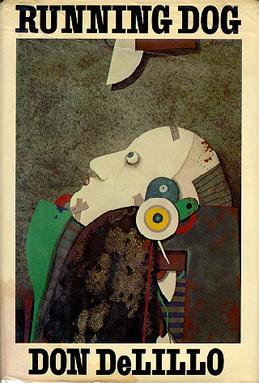One of DeLillo’s early novels (first published in 1978), Running Dog looks at first like a thriller story (with his trademarked touch of irony) centered around the alleged existence of a pornographic film produced during the last days of Adolf Hitler’s life and starring the man himself as part of an orgy in the Fuehrerbunker. All characters in the book are involved to some degree in the search for this film: journalist Moll Robbins from Running Dog magazine, pornographic art dealer Lightborne, Senator & pornographic art collector Percival, Glen Selvy and Earl Mudger – both involved in a clandestine organization called Radial Matrix. Although no one has seen the film and its existence is highly questionable, everyone gets strongly involved in the search. Inside the mystery story frame, the book includes most of the topics that DeLillo will later on develop in famous novels like White Noise, Underworld and Cosmopolis. It's all about consumerism, isolated lives and fragmentary dialogs in late 20th century America, how tabloid media fills the world with useless, contradictory and confusing information etc.
In an interview with Anthony DeCurtis, published in 1988 in the Rolling Stone magazine, DeLillo explains the plot this way:
"What I was really getting at in Running Dog was a sense of the terrible acquisitiveness in which we live, coupled with a final indifference to the object. After all the mad attempts to acquire the thing, everyone suddenly decides that, well, maybe we really don't care about this so much anyway. This was something I felt characterized our lives at the time the book was written, in the mid to late seventies. I think this was part of American consciousness then."

Favorite quote (that appears in Cosmopolis as well): “The logical extension of business is murder” (In Running Dog it’s a quote from Chaplin, whereas in Cosmopolis it’s just a line Eric delivers after sleeping with the girl with “cinnamon skin” & a bit more than 6% of body fat).
In an interview with Anthony DeCurtis, published in 1988 in the Rolling Stone magazine, DeLillo explains the plot this way:
"What I was really getting at in Running Dog was a sense of the terrible acquisitiveness in which we live, coupled with a final indifference to the object. After all the mad attempts to acquire the thing, everyone suddenly decides that, well, maybe we really don't care about this so much anyway. This was something I felt characterized our lives at the time the book was written, in the mid to late seventies. I think this was part of American consciousness then."

Favorite quote (that appears in Cosmopolis as well): “The logical extension of business is murder” (In Running Dog it’s a quote from Chaplin, whereas in Cosmopolis it’s just a line Eric delivers after sleeping with the girl with “cinnamon skin” & a bit more than 6% of body fat).

No comments:
Post a Comment